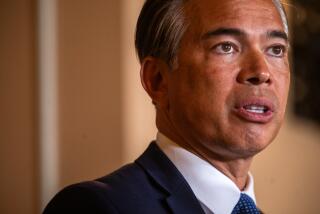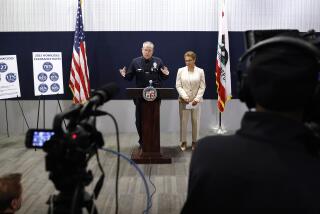Videotaping by Deputies Draws Fire : West Hollywood: The Sheriff’s Department says tapes of parades and marches are used for crowd-control training. Gays claim harassment.
The Los Angeles County Sheriff’s Department’s practice of videotaping marches, parades and other events has come under criticism in West Hollywood, where city officials say the practice has increased tensions between the department and the gay community.
Mayor John Heilman has asked the Sheriff’s Department to abandon in West Hollywood the practice that it has instituted countywide.
“I don’t think the sheriffs are doing it for any bad purpose,” Heilman said. “But it is a matter of the perception that Big Brother is watching that increases tensions with the sheriffs rather than decreases it.
“In the past, the gay community has frequently been the subject of police raids and FBI surveillance. Given the history of this country, there are a lot of people who feel very sensitive when they see uniformed police officers videotaping a public event.”
Heilman said a number of people approached him during an AIDS memorial march last month to express their outrage about being filmed by uniformed officers.
The Sheriff’s Department officials say the videotapes are taken not to identify faces in a crowd but as training exercises in crowd control.
“We take tapes of these events so that we can train our personnel what to expect,” said Lt. Richard Odenthal of the Sheriff’s Department’s emergency operations bureau. “We have a lot of people who have never worked with large crowds. There are no individual faces used; it’s mostly crowd stuff. And the officers are in full uniform near a black and white car. There is nothing covert about it.”
In a June 8 memo, Chief Duane T. Preimsberger reminded those in his field operations Region II command of the department’s policy on videotaping.
“I view this device as a tool which is critical in protecting our deputies from false accusation of brutality and other improprieties,” he wrote. “I am insisting that this tool be deployed when appropriate and particularly when time permits planning for its use. Deployment at loud parties, major disturbances and high-profile incidents should become routine.”
But a spokesman for AIDS Coalition to Unleash Power, a militant AIDS activist group that has staged boisterous sit-in demonstrations at Board of Supervisors meetings, said the policy has been used to identify and harass its members.
“It’s a questionable practice,” said David Etezadi, member of ACT-UP Los Angeles. “It appears to us they are using it to identify people in political activities.”
“They are paranoid,” Capt. Rachel Burgess of the West Hollywood station said. “We are not trying to videotape individuals. It is just crowds and crowd control. We are not concerned about ACT-UP unless they are doing something against the law. And we are certainly not trying to expose any gay person.”
ACT-UP has received support from the American Civil Liberties Union Foundation of Southern California, which has been critical of the videotapings.
“When the police begin photographing or videotaping, it makes people feel they are being identified or under surveillance,” said Jon Davidson, senior staff counsel at the ACLU. “It raises a great concern that that will deter some individuals from participating in forms of political expression or protest. The government does have a responsibility not to interfere with free speech.”
The criticism comes at a time when the city is preparing to play host June 24 to the 20th annual Gay and Lesbian Pride Parade in West Hollywood, an event that draws about 200,000 people and is expected to be broadcast live in 28 cities in the United States and Canada.
The city’s Public Safety Commission recently recommended that videotaping of the parade “not be selective and that representatives of the gay and lesbian community be included in the editing process. . . .”
Sheriff’s department officials say there are no plans to film the parade, although a camera will be available if it is needed in case of emergency.
Organizers of the parade say they have no objections to the Sheriff’s Department’s videotaping the event.
“It was sort of standard operating procedure for the sheriff’s deputies to tape our parade. We never thought of it as a negative thing,” said Joe Toy, president of Christopher Street West Assn.
Wuzzy Spaulding, who co-chairs the West Hollywood Community/Sheriff’s Conference Committee, agreed. “With all the television coverage that will be at the parade, people shouldn’t worry about being exposed by the police,” he said. “Why is it that the television stations are allowed to videotape the event and the sheriffs should not?”
Capt. Burgess said she would be willing to show any videotapes made by the West Hollywood sheriff’s deputies to representatives of community groups as long as the tapes are not connected with an ongoing criminal investigation.
She said her department used the video camera to document problems with the nightly feeding program in Plummer Park, showing that many of the homeless in the feeding lines had outstanding arrest warrants. “The city used that information in making its decision to close down the program,” she said.
Burgess said the station has not used the camera to go after those who solicit male prostitutes on West Hollywood’s east side, as has been requested by some, because the issue is a very sensitive one among gays in the community.
But the camera will be used to evaluate police procedures, including the conduct of officers during arrests, she said.
“It will send a message to deputies that they will not get away with unprofessional behavior, because someone may be watching,” she added.
More to Read
Sign up for Essential California
The most important California stories and recommendations in your inbox every morning.
You may occasionally receive promotional content from the Los Angeles Times.










